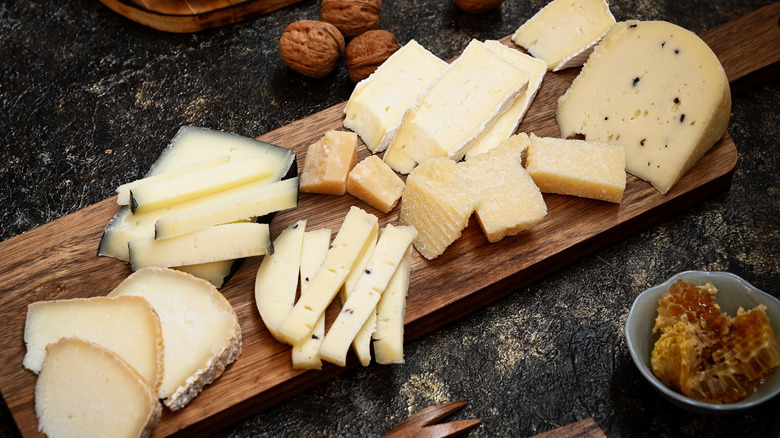If You Need More Zinc, Start Eating This Type Of Cheese
More than one billion people across the globe aren't getting enough zinc, according to research published in Scientific Reports. Zinc is an essential nutrient that you can get through a variety of food sources and supplements. This mineral plays a critical role in immunity, wound healing, blood clotting, vision health, thyroid function, and more (per WebMD). Without enough zinc in your diet, you can experience loss of appetite and poor immunity, according to Medical News Today. Zinc deficiency symptoms also include slowed growth, hair loss, diarrhea, lethargy, eye and skin lesions, as well as delayed sexual maturity.
For men, the recommended dietary guidelines suggest consuming 11 milligrams of zinc per day and women should aim for 8 milligrams daily (via Mayo Clinic). Good sources of zinc are chicken, red meat, and fish. If you are vegan or don't eat much meat and fear you may not be getting enough zinc, the good news is there's one type of cheese that can provide you with a fair amount of this nutrient. We'll give you a hint — this particular cheese's claim to fame is its large, porous holes — a result of carbon dioxide buildup during its long maturation process, which gives it its bold flavor.
This cheese provides 8% of the suggested daily value for zinc
According to sports dietitian Natalie Rizzo, Swiss cheese can help push us towards our daily zinc goals. "One ounce of Swiss cheese has 1.2 mg—or about 8 percent [of] your daily value," she told The Healthy. Swiss cheese also provides us with other essential nutrients, including calcium, vitamin A, and vitamin B-12 (per WebMD). Not only that, its high protein content can aid in bone health, muscle growth, and metabolism function.
Keep in mind that the body needs only a small amount of zinc, and getting too much of this trace mineral can pose some health risks. According to the Mayo Clinic, these include headaches, nausea, vomiting, and the development of a copper deficiency. Because zinc does such a good job of helping fight viruses, many people turn to zinc supplements during cold and flu season but might overdo it. The National Institutes of Health advises no more than 40 milligrams of zinc a day for adults.
If you think you might have a zinc deficiency, try snacking on Swiss cheese or adding some slices to your sandwich. It's a tastier option over supplements, and you're less likely to exceed daily requirements. But keep in mind that eating large amounts of Swiss cheese over time can pose its own unique health risks, including high blood pressure, heart disease, or digestive discomfort in those who are lactose intolerant (via WebMD). Therefore, Swiss cheese is best consumed in moderation.


